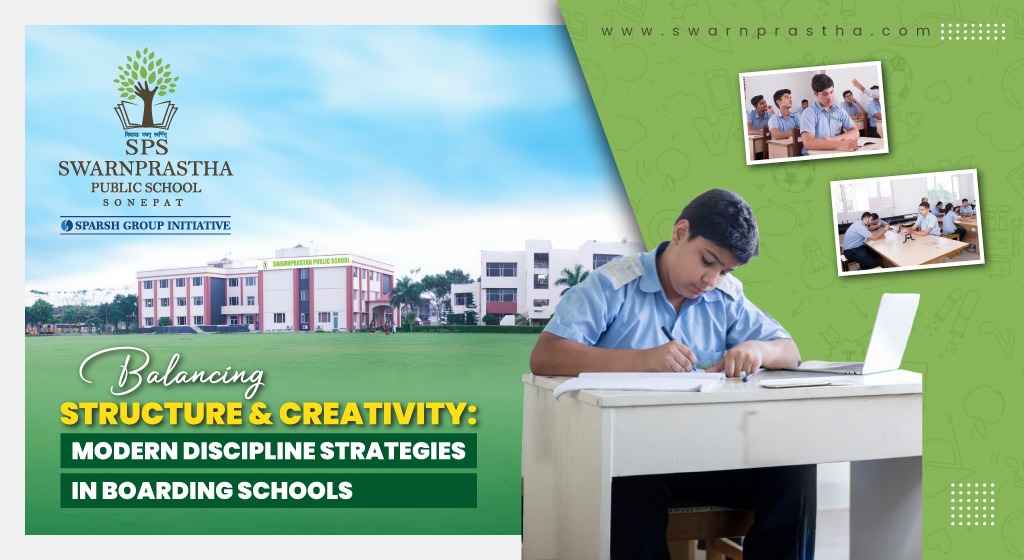Boarding schools have established a reputation for structured learning environments that promote discipline and academic achievement. Modern educational approaches demonstrate that discipline is most effective when combined with creative elements, as this approach enables students to learn essential skills while retaining their individuality. When structure combines with creativity, students become well prepared academically, show holistic growth and become more adaptable socially.

The Importance of Structure in Boarding Schools
A boarding school requires a well-established structure to achieve success. Students benefit from established routines because the order helps create stability, which in turn promotes better time management. Boarding school routines, featuring set time slots for study, along with regular classes and scheduled outside activities, create a setting where students can learn while developing self-control skills.
A structured environment teaches students to be punctual while developing responsibility and respect for rules. The qualities provided by structure serve young individuals well as they move into adulthood. Boarding schools implement a structured environment to promote academic success by keeping their students committed to their learning and fostering the development of strong work ethics.
The Role of Creativity in Discipline
Creative principles in organisational systems create superior outcomes. Regular disciplinary procedures, enforced through detention or suspension, fail to produce stable improvements in student conduct and behaviour. Through creativity in discipline, students can develop knowledge by reflecting on their own actions using effective learning approaches derived from their mistakes.
Restorative practices emerge as the most effective method for incorporating creative elements into disciplinary actions. Boarding schools should move away from punishment-based approaches by involving students in discussions about their behavioural choices. Knowledge about possible outcome of actions helps students develop both empathy and awareness of responsibility.
Positive reinforcement functions as a different organisational strategy for discipline. When students receive acknowledgment together with special privileges, they maintain school values as a sign of recognition for their good behaviour. This disciplinary technique enhances student discipline, strengthens self-esteem and drives students to develop personally.
Modern Discipline Strategies in Boarding Schools
Many boarding schools have adopted progressive discipline strategies that balance structure and creativity. Some of the most effective methods include:
1. Mentorship and Counselling
Personalised mentorship and counselling programmes provide students with guidance, helping them navigate challenges in a supportive environment. Mentors provide academic guidance to students, helping them resolve their school-related difficulties. Mentors in this programme support individuals who require assistance with social relationships and emotional health issues. Students benefit from having a trusted adult advisor who helps them develop informed choices through the process of making mistakes.
2. Peer Mediation and Conflict Resolution
Boarding schools implement peer mediation systems, which help students resolve conflicts with their peers. Schools employ this technique to minimise behavioural issues, thereby supporting students in developing leadership skills while enhancing their problem-solving abilities. Student-driven discussions about behaviour enable the development of respectful attitude as well as collaborative associations.
3. Community Service as a Learning Tool
Selected boarding facilities choose community service as their primary disciplinary system, rather than imposing conventional disciplinary measures. This develops empathy. Social service education emerges through student involvement in school volunteer tasks and service-based activities.
4. Interactive Workshops and Role-Play
The curriculum offers essential training sessions that equip students with emotional intelligence, conflict resolution skills and decision-making principles to enhance their ability to take control of their actions. Through role-play, students gain a clearer understanding of alternative perspectives and their impact on underlying situations.
Achieving Balance Between Structure and Creativity
A comprehensive approach is necessary to strike a suitable balance between structure and creativity when developing discipline policies. Schools need to specify rules and enforce them equally, adjusting these policies as needed to meet the specific needs of individual students. Standard disciplinary methods might lack effectiveness because individual students have distinctly different reactions to discipline strategies.
Successful exchange of information must exist among teachers, students and parents. Students at boarding schools require a positive system of information sharing, which makes them feel engaged in the process. The act of student involvement in disciplinary policy development creates personal responsibility in students regarding their behaviour choices.
Furthermore, incorporating elements of social-emotional learning into the curriculum can enhance students’ ability to regulate their behaviour and interact positively with others. Schools prepare their students to handle obstacles through educational instruction on self-awareness, together with emotional management and social competency abilities.
Conclusion
Boarding schools need to develop their discipline approach to address student requirements. Boarding schools achieve student growth when structure is combined with innovative methods to make discipline matter more than mere rule enforcement. Approaches such as mentorship, peer mediation and creative expression ensure that students develop a strong moral compass while also embracing their individuality.
At Swarnprastha Public School, the focus is on nurturing well-rounded individuals by integrating structured routines with innovative disciplinary strategies. By prioritising both academic excellence and personal growth, Swarnprastha Public School ensures that students emerge as confident, responsible and empathetic individuals, ready to excel in all aspects of life.


